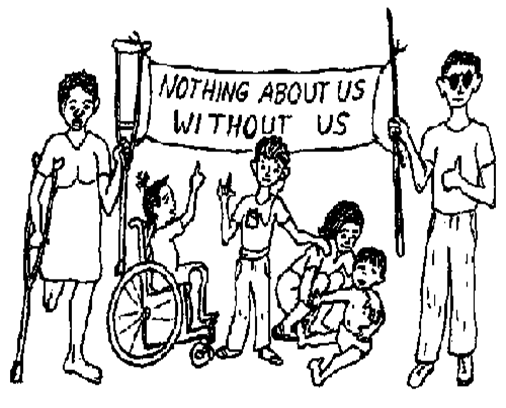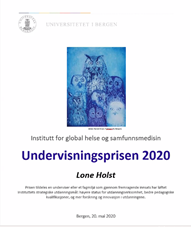IGS Department Day 20.5.2020
UiB’s COVID-19 Lockdown meant that the Department’s Annual gathering was held virtually via ZOOM rather than face-to-face. Despite this – or maybe because of this – there were up to 100 people attending!

Hovedinnhold
The theme for 2020 was “User Involvement in Research” and the committee organised presentations from an interesting and varied group.
Welcome
Guri Rørtveit, the Head of the Department of Global Public Health and Primary Care (IGS), kicked off the seminar by expressing her appreciation for the efforts all IGS employees have made towards enabling UiB to become a virtual university – overnight. She challenged everyone to reflect on what has been learned, and how to bring the best of this experience forward into the Department’s future activity.
The Leader for Research at IGS, Bjarne Robberstad, began by stating that not only is involving users in research the “right thing to do”, it is also a strategically good thing to do. Users, he explained, have a right to influence research; they have valid knowledge that can be important to include. He asked the seminar participants to consider aspects of the degree of user involvement: as consultants, as collaborators, and/or as co-researchers. He also highlighted that there are possible drawbacks to consider.
Målfrid Raaheim: “Innovative user involvement” – How to engage users and other stakeholders in the development of an integrated research agenda?
“The outcome is a relevant and useful research agenda that better enables health-care services to meet the needs of and expectations from the patients”
Tineke Abma et al 2015
The first speaker, Målfrid Raaheim, talked about the “Dialogue Model” that she has been involved with in her work, and which she and colleagues are using in their RCN (Research Council of Norway) application, “Partnership building in research agendas for improved health care services”. The project aims to better adapt health services to patient needs using a new, dialogue-based approach to user involvement to develop an integrated research agenda.
Christine Ødegaard and Anne Blindheim, Helse Bergen: Advantages and disadvantages of user involvement in research. Dialogue between a researcher and an experienced user.
PhD Candidate, Christine Ødegaard, introduced her colleague and co-researcher, Anne Blindheim as an expert by experience. An expert by experience is a person who has lived experience of a given health issue. The idea behind recognising and using such persons in research is that experience-based knowledge is needed to develop the best, most adapted services, which include changing attitudes and creating an understanding of the kinds of challenges which people meet during their lifespan.

Elin Anthonisen, Kreftforeningen (Cancer Society): Innovative user involvement in research: How to and not to involve users before, during and after research projects?
Elin Anthonisen is the Head of the Research Section at the Cancer Society. She explained that they have extensive experience with different kinds of user involvements in cancer research. Her presentation was filled with many tips and reflections on the advantages and ways to involve users. She concluded by saying that having users involved in the research process is enriching.

Rune Samdal: Brukermedvirkning i forskning – erfaringer og refleksjoner om videre utvikling.
(User involvement in research – experience and reflections on further developments)
Rune Samdal is the only user representative actually employed at UiB. He spoke about users contributing at different levels and may take on different roles. He feels that users contribute best during an early phase of the research process.

Summary
Bjarne Robberstad summarised highlights from the 4 interesting presentations:
- Involving users is innovative and useful
- User involvement is best when based on constructive dialogue
- Lived experience is that user involvement is deeply relevant
Prizes
- This year’s IGS Teaching Award goes to Lone Holst. Read more in Norwegian.
- This year’s IGS Publication Award goes to Andrea Melberg. Read more in Norwegian.
Per’s Corner
The Dean of the Medical Faculty, Per Bakke concluded the Day’s seminar with a few remarks. He expressed his appreciation of how people had coped well with the challenges of Lockdown. He highlighted that it has not been without cost, with the Faculty having lost about 25 million NOK during this period. He cautioned that budget cuts will be a harsh reality.
Bakke noted that decision-making during this period has been very top-down from the university centrally. Future decisions regarding preparedness, however, can now be made at the Department level, for the most part.
Bakke highlighted that the “corona crisis” contains many opportunities for MED researchers, and that IGS is particularly well placed to be involved. He gave several examples including vaccine research, the establishment of a pandemic centre, elderly research and life-long learning opportunities.

Final thank-you
Guri Rørtveit wrapped up the seminar by thanking the speakers for their inspirational contributions. She said that the ideas and reflections about user involvement were timed well to contribute to the current on-going work revising the IGS research strategy. Rørtveit also thanked the seminar committee for their efforts to make this a valuable experience for all.

